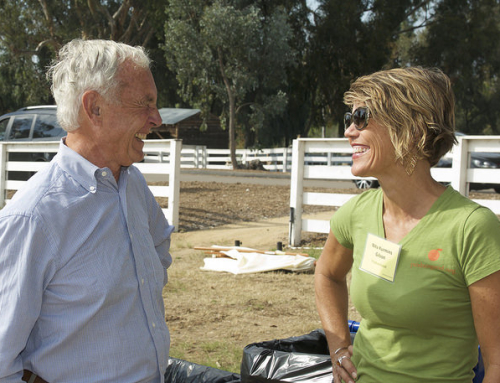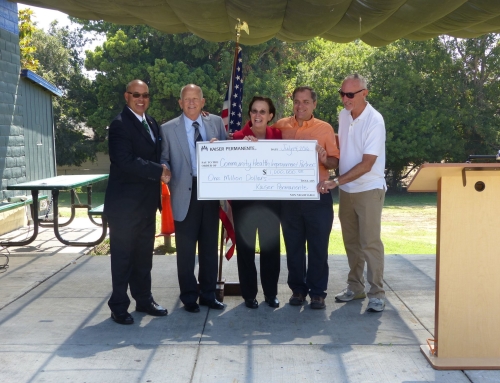By Elizabeth Vaughan, Food Systems Coordinator
It’s been a productive spring season for CHIP Food Systems’s farm-to-school efforts. From scratch cooking techniques to turning kitchen scraps into school garden compost, the Farm-to-School Taskforce (F2ST) continued to sow seeds over the past several months sure to grow the region’s farm-to-school movement.
For March’s F2ST meeting, Sally Spero, Food Service Director, and Jim Dumars, Executive Chef, at Lakeside Union School District provided a presentation on how the district has taken their kitchen to a whole new level. By renovating kitchen space, training staff, ordering fresh ingredients and creating their own recipes, Lakeside Union is feeding their kids healthy, freshly prepared meals and snacks. Now salt and sugar levels are much more controlled and the participation rate has increased by 25%. Not bad for a public school district on a budget, right?
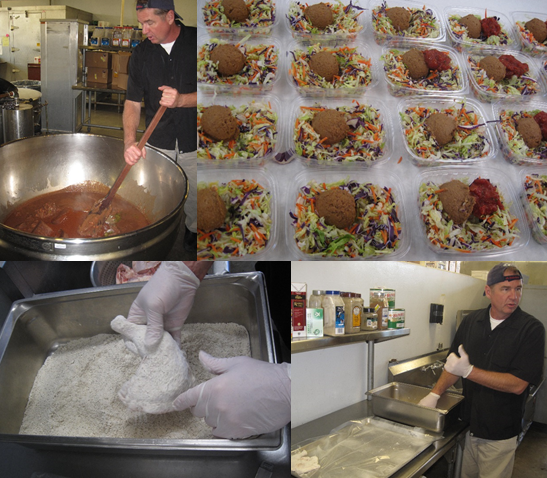
Chef Jim Dumars preparing lunch at Lakeside Union School District.
In March we also heard from Jonathan Zaidman at 1to1 Movement, who presented their impressive program Stacked, a double decker bus retrofitted to be a mobile greenhouse and classroom, which all the farm-to-school advocates in the region are eagerly awaiting.
Twelve other public school districts exemplifying amazing scratch cooking abilities brought their best recipes forward at the Center for Ecoliteracy’s CA Food for CA Kids Celebration Event at the Waterfront Park in Downtown San Diego on March 16th. Encinitas Unified featured their ceviche using line caught fish, Julian served local bison sliders and Vista Unified served a baby greens salad produced by Solutions Farm, a local aquaponic farm. All 12 of the district’s dishes were delicious, with attending guests constantly remarking, “I wish we had school meals like this when I was a kid!” This event as well as the California Thursdays Collective Day of Action on March 17th were profiled recently in other blog posts here and here.
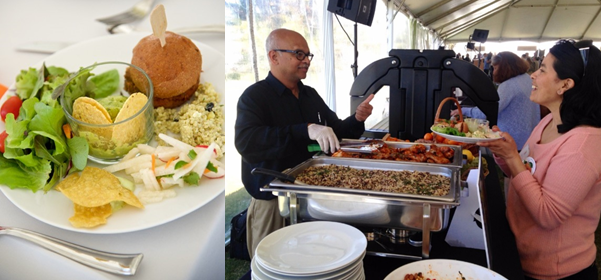
Lunch displays at CA Food For CA Kids Celebration Event, March 16, 2016.
Two other major farm-to-school wins this Spring included the release of CHIP’s third annual State of Farm to School in San Diego County report showing San Diego County schools’ $6.9 million in local food purchasing, as well as brokering several deals between good food businesses and school districts. Among other wins, this brokering has resulted in local fish from Catalina Offshore now being served in several San Diego County school districts! Stay tuned for separate stories on these successes.
Moving from plate to waste, May’s F2ST meeting brought together over 50 attendees and three speakers around the important topic of food waste and Assembly Bill 1826, a bill that will impact any business generating more than 4 cubic yards of waste by 2017. Solana Center for Environmental Innovation discussed various strategies for monitoring and controlling food waste. Gloria Quinn, a teacher at Ramona High inspired the audience with their strategies for achieving zero waste within the district. Using a 600 gallon Earth Tub, Ramona Unified has been able to achieve zero waste at all eight school sites, generated compost for their school garden, donated 500 pounds of left-over uneaten food to a local non-profit, and achieved cost savings of $18,000 for the district. Ramona has received some fantastic press coverage on their efforts, and we can definitely see why!
Kitchens for Good and Alchemy San Diego also presented in May on the culinary trainings they implemented in two school districts in 2015, which trained school nutrition staff in scratch cooking skills. Alchemy and Kitchens for Good are leading partners in the region addressing the important issues of how food prep and food waste go hand-in-hand.
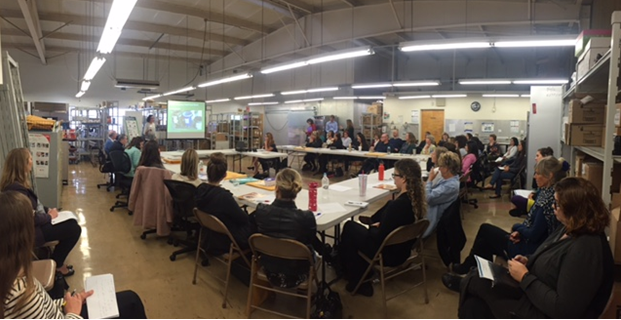
Jessica Toth, Executive Director at the Solana Center presenting at May’s F2ST meeting.
Our May F2ST meeting also served as our annual California Farm-to-School Network (CFSN) regional gathering, and was recently profiled on the CFSN blog. To make this meeting a bit more regional, we heard results from our farm-to-school partners in Orange County, the Orange County Food Access Coalition (OCFAC), who just released results from their first ever State of Farm to School in Orange County survey. They got a 100% response rate and every district in the County is participating in at least one type of farm-to-school activity. Congrats Orange County!
Lastly, to get more good food into our schools, CHIP shared at the end of the May F2ST meeting that we are launching a Good Food Rebate Program in the Fall that will rebate a school district 20% of their good food purchases up to $10,000 in rebates, covering the marginal cost of purchasing more local, sustainable, and/or fairly-sustainable food. The number one barrier cited to buying and serving more good food in schools is cost, and CHIP Food Systems is putting its creative energy to work to address this barrier. The rebate program will come with a tailored 9-month technical assistance package to help the participating district grow and sustain their farm-to-school program. The RFP is currently open for North Coastal districts to apply. Contact CHIP Food Systems for details.
These seeds and many more have been planted and we are very much looking forward to seeing the harvest come fall! Thanks to San Diego County’s phenomenal group of farm-to-school advocates for a fantastic spring, and we look forward to a summer of planning for another great year of farm-to-school!

